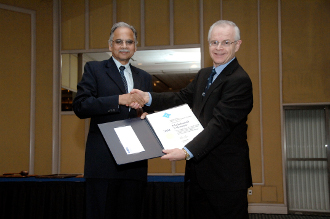
CV
Curriculum Vitae of
Mathukumalli Vidyasagar
Fellow of The Royal Society
Distinguished Professor and
formerly SERB National Science Chair
Indian Institute of Technology Hyderabad
Contents
Educational BackgroundCareer Profile
Awards and Honors
Erdös and Einstein Numbers
Brief Biography
For an up to date resume, current as of September 2025, please click here
Educational Background
| Degree | Institution | Year |
|---|---|---|
| B.S. (E.E) | University of Wisconsin, Madison | 1965 |
| M.S. (E.E.) | University of Wisconsin, Madison | 1967 |
| Ph.D. (E.E.) | University of Wisconsin, Madison | 1969 |
Career Profile
| Institution | Location | Position | Period |
|---|---|---|---|
| Marquette University | Milwaukee, USA | Asst. Prof. | 1969-70 |
| Concordia University | Montreal, Canada | Asst. -- Prof. | 1970-80 |
| University of Waterloo | Waterloo, Canada | Professor | 1980-89 |
| Centre for AI & Robotics | Bangalore, India | Director | 1989-2000 |
| Tata Consultancy Services | Hyderabad, India | Executive Vice President | 2000-09 |
| University of Texas at Dallas | Dallas, USA | Chaired Professor | 2009 -- 2019 |
| Indian Institute of Technology Hyderabad | Hyderabad, India | Distinguished Professor | 2015 -- date |
Awards and Honors
- 1976: Prix Georges Montefiore, Association of Belgian Electrical Engineers, for best original research in electrical engineering during the period 1970-75, for the book "Feedback Systems: Input-Output Properties"
- 1981: E. W. R. Steacie Memorial Prize, Natural Sciences and Engineering Research Council of Canada, for being an outstanding young researcher.
- 1983: Fellow, Institute of Electrical and Electronics Engineers (IEEE), "For contributions to the stability theory of linear and nonlinear distributed systems"
- 1984: Frederick Emmons Terman Award, American Society for Engineering Education, for combining teaching and research excellence.
- 1987: Best Paper Award, Society of Instrumentation and Control Engineers, Japan.
- 1992: Fellow, Indian Academy of Sciences
- 1992: Fellow, Indian National Academy of Engineering
- 1994: Fellow, Indian National Academy of Science
- 1995: Distinguished Service Citation, College of Engineering, University of Wisconsin
- 1997: Fellow, Third World Academy of Sciences, Trieste, Italy
- 1997: Scientist of the Year, Defence Research and Development Organisation, Government of India.
- 2000: Hendrik W. Bode Lecture Prize, IEEE Control Systems Society, ``For seminal contributions to systems science and engineering, especially nonlinear, robust and optimal control, robotics, and statistical learning theory''
- 2002: Best Paper Prize (Methodology) from the International Federation of Automatic Control (IFAC) for the paper entitled ``Randomized algorithms for robust controller synthesis using statistical learning theory.'' This paper was adjudged to be the best "methodology" (theory) paper published in the journal Automatica during the period 1999-2002.
- 2004: Named as one of "Forty Tech Gurus" in the November 2004 issue of IEEE Spectrum.
- 2005: Jawaharlal Nehru Centenary Lecture Prize, Indian National Science Academy.
- 2008: IEEE Control Systems Award, for "Promulgation of control science and engineering and contributions to robust control, robotics and statistical learning theory"
- 2011: Harry H. Nyquist Lecture Award, American Society of Mechanical Engineers.
- 2012: Fellow, The Royal Society, United Kingdom.
- 2012: Fellow, The Institute of Physics, United Kingdom.
- 2012: Rufus Oldenburger Medal, American Society of Mechanical Engineering, "For his fundamental contributions to robust control theory, specifically L1-optimal control theory for linear control systems; nonlinear control theory, especially input-output stability theory; robotics, including the control of flexible beams; statistical learning theory and machine learning; and computational biology"
- 2013 John Ragazzini Education Award, American Automatic Control Council, "For outstanding contributions to automatic control education through publication of textbooks and research monographs"
- 2015: Jawaharlal Nehru Science Fellowship, Government of India
- 2017: Fellow, International Federation of Automatic Control
- 2017: Named as 125 "People of Impact" during the 125th anniversary of the Department of Electrical Engineering, University of Wisconsin
- 2018: Member TAMEST (The Academy of Medicine, Engineering and Science of Texas), open only to Members of the National Academies of Medicine, Engineering, and Sciences, and to Fellows of The Royal Society, based in Texas.
- 2019 SERB (Science and Engineering Research Board) Distinguished Fellowship.
- 2020 SERB National Science Chair
Erdös and Einstein Numbers
My Erdös number is two and my Einstein number is three.The path to Paul Erdös is:
M. Vidyasagar -> M. V. Subbarao (My father) -> Paul Erdös
The path to Albert Einstein is:
M. Vidyasagar -> M. V. Subbarao -> Ernst Straus -> Albert Einstein
The papers in these two chains are given below.
M. Vidyasagar -> M. V. Subbarao
- M. V. Subbarao and M. Vidyasagar, "On Watson's quintuple product identity", Proc. Amer. Math. Soc., 26, 23-27, September 1970. PDF
- G. E. Andrews, M. V. Subbarao and M. Vidyasagar, "A family of combinatorial identities", Can. Math. Bull. 15(1), 11-18, January 1972. PDF
- P. Erdös and M. V. Subbarao, "On the iterates of some arithmetic functions", Lecture Notes in Mathematics, 251, 119-125, 1972. PDF
- P. Erdös, G. E. Hardy and M. V. Subbarao, "On th Schnirelmann identity of k-free integers", Indian Journal of Mathematics, 46-55, 1978.
- E. G. Straus and M. V. Subbarao, "On exponential divisors", Duke Math. J., 41, 465-471, 1974. PDF
- E. G. Straus and M. V. Subbarao, "On the representation of franctions as sum and difference of three different simple fractions", Congressus Numerantium, 561-579, 1977. PDF
- A. Einstein and E. G. Straus, "A generalization of the relativistic theory of gravitation II", Annals of Mathematics, 47(4), 731-741, October 1946. pdf
